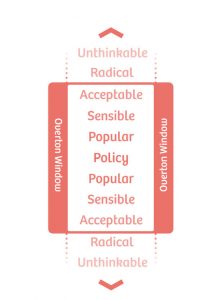Radical Economic Change
How Ideas Conquer the World
May 17, 2020Overton Window.
Rutger Bregman
When the market crashed in 2008, it became clear that neoliberalism was not the way forward. But at the time, neither the protesters of Occupy Wall Street nor politicians had realistic alternatives.
Now, over a decade later during the biggest crisis since the Second World War, it’s different.
Economists, philosophers and politicians have been fighting the cynical dogma that most people are selfish for years. They’ve been working on real alternatives.
Now we know: humankind is actually not selfish, but has evolved due to its unparalleled willingness to cooperate. If, going forward, we took that fact seriously, everything could change. Governments could be based on trust. Tax systems could be rooted in solidarity. Social security could be reformed.
We don’t know where this crisis will lead us, writes Rutger Bregman, but this time the groundwork has been laid for a radically different world.
The neoliberal era is ending. What comes next?
On 4 April 2020, the British-based Financial Times published an editorial likely to be quoted by historians for years to come.
The Financial Times is the world’s leading business daily and, let’s be honest, not exactly a progressive publication. It’s read by the richest and most powerful players in global politics and finance. Every month, it puts out a magazine supplement unabashedly titled “How to Spend It” about yachts and mansions and watches and cars.
But on this memorable Saturday morning in April, that paper published this:
“Radical reforms – reversing the prevailing policy direction of the last four decades – will need to be put on the table. Governments will have to accept a more active role in the economy. They must see public services as investments rather than liabilities, and look for ways to make labour markets less insecure. Redistribution will again be on the agenda; the privileges of the elderly and wealthy in question. Policies until recently considered eccentric, such as basic income and wealth taxes, will have to be in the mix.”
What’s going on here? How could the tribune of capitalism suddenly be advocating for more redistribution, bigger government, and even a basic income?
For decades, this institution stood firmly behind the capitalist model of small government, low taxes, limited social security – or at most with the sharpest edges rounded off. “Throughout the years I’ve worked there,” responded a journalist who has written for the paper since 1986, “the Financial Times has advocated free market capitalism with a human face. This from the editorial board sends us in a bold new direction.”
[…]
Crises played a central role in economist Milton Friedman’s thinking. In the preface to his book Capitalism and Freedom (1982), he wrote the famous words:
“Only a crisis – actual or perceived – produces real change. When that crisis occurs, the actions that are taken depend on the ideas that are lying around.”
DISSOLVE THE PATRIARCHY. ENOUGH.
US president-elect Ronald Reagan in Los Angeles in November 1980. Reagan consulting with his economic advisers about his new economic policy. From left to right: Walter Wriston, Milton Friedman, Daryl Trent, George Shultz, Ronald Reagan, Paul McCracken. Photo: Bettmann / Getty
In recent weeks, lists have been published all over the world of what we’ve started calling “essential workers”. And surprise: jobs like “hedge fund manager” and “multinational tax consultant” appear nowhere on those lists. All of a sudden, it has become crystal clear who’s doing the truly important work in care and in education, in public transit and in grocery stores.
In 2018, two Dutch economists did a study leading them to conclude that a quarter of the working population suspect their job is pointless. Even more interesting is that there are four times more “socially pointless jobs” in the business world than in the public sphere. The largest number of these people with self-professed “bullshit jobs” are employed in sectors like finance and marketing.
[…]
In recent years, the Overton Window has undeniably shifted. What once was marginal is now mainstream. A French economist’s obscure graph became the slogan of Occupy Wall Street (“We are the 99%”); Occupy Wall Street paved the way for a revolutionary presidential candidate, and Bernie Sanders pulled other politicians like Biden in his direction.
These days, more young US Americans have a favourable view of socialism than of capitalism – something that would have been unthinkable 30 years ago. (In the early 1980s, young voters were the neoliberal Reagan’s biggest support base.)
[…]
One thing is certain. There comes a point when pushing on the edges of the Overton Window is no longer enough. There comes a point when it’s time to march through the institutions and bring the ideas that were once so radical to the centres of power.
I think that time is now.

